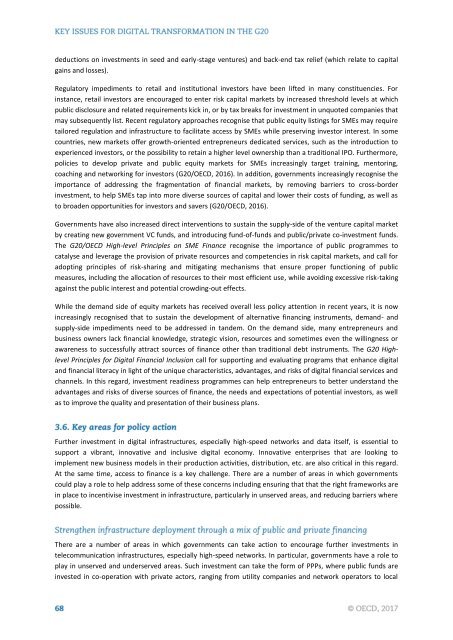KEY ISSUES FOR DIGITAL TRANSFORMATION IN THE G20
2jz0oUm
2jz0oUm
You also want an ePaper? Increase the reach of your titles
YUMPU automatically turns print PDFs into web optimized ePapers that Google loves.
deductions on investments in seed and early-stage ventures) and back-end tax relief (which relate to capital<br />
gains and losses).<br />
Regulatory impediments to retail and institutional investors have been lifted in many constituencies. For<br />
instance, retail investors are encouraged to enter risk capital markets by increased threshold levels at which<br />
public disclosure and related requirements kick in, or by tax breaks for investment in unquoted companies that<br />
may subsequently list. Recent regulatory approaches recognise that public equity listings for SMEs may require<br />
tailored regulation and infrastructure to facilitate access by SMEs while preserving investor interest. In some<br />
countries, new markets offer growth-oriented entrepreneurs dedicated services, such as the introduction to<br />
experienced investors, or the possibility to retain a higher level ownership than a traditional IPO. Furthermore,<br />
policies to develop private and public equity markets for SMEs increasingly target training, mentoring,<br />
coaching and networking for investors (<strong>G20</strong>/OECD, 2016). In addition, governments increasingly recognise the<br />
importance of addressing the fragmentation of financial markets, by removing barriers to cross-border<br />
investment, to help SMEs tap into more diverse sources of capital and lower their costs of funding, as well as<br />
to broaden opportunities for investors and savers (<strong>G20</strong>/OECD, 2016).<br />
Governments have also increased direct interventions to sustain the supply-side of the venture capital market<br />
by creating new government VC funds, and introducing fund-of-funds and public/private co-investment funds.<br />
The <strong>G20</strong>/OECD High-level Principles on SME Finance recognise the importance of public programmes to<br />
catalyse and leverage the provision of private resources and competencies in risk capital markets, and call for<br />
adopting principles of risk-sharing and mitigating mechanisms that ensure proper functioning of public<br />
measures, including the allocation of resources to their most efficient use, while avoiding excessive risk-taking<br />
against the public interest and potential crowding-out effects.<br />
While the demand side of equity markets has received overall less policy attention in recent years, it is now<br />
increasingly recognised that to sustain the development of alternative financing instruments, demand- and<br />
supply-side impediments need to be addressed in tandem. On the demand side, many entrepreneurs and<br />
business owners lack financial knowledge, strategic vision, resources and sometimes even the willingness or<br />
awareness to successfully attract sources of finance other than traditional debt instruments. The <strong>G20</strong> Highlevel<br />
Principles for Digital Financial Inclusion call for supporting and evaluating programs that enhance digital<br />
and financial literacy in light of the unique characteristics, advantages, and risks of digital financial services and<br />
channels. In this regard, investment readiness programmes can help entrepreneurs to better understand the<br />
advantages and risks of diverse sources of finance, the needs and expectations of potential investors, as well<br />
as to improve the quality and presentation of their business plans.<br />
Further investment in digital infrastructures, especially high-speed networks and data itself, is essential to<br />
support a vibrant, innovative and inclusive digital economy. Innovative enterprises that are looking to<br />
implement new business models in their production activities, distribution, etc. are also critical in this regard.<br />
At the same time, access to finance is a key challenge. There are a number of areas in which governments<br />
could play a role to help address some of these concerns including ensuring that that the right frameworks are<br />
in place to incentivise investment in infrastructure, particularly in unserved areas, and reducing barriers where<br />
possible.<br />
There are a number of areas in which governments can take action to encourage further investments in<br />
telecommunication infrastructures, especially high-speed networks. In particular, governments have a role to<br />
play in unserved and underserved areas. Such investment can take the form of PPPs, where public funds are<br />
invested in co-operation with private actors, ranging from utility companies and network operators to local


